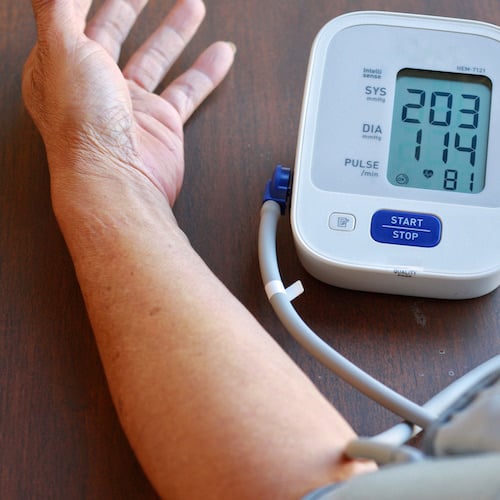For many years, researchers have tried to further advance their knowledge on how certain diseases are passed from one generation to another. There is a long list of diseases and health issues that are said to be hereditary, and one of these would be hypertension.
Hypertension occurs when a person’s blood pressure levels are above the recommended level of 120/80 mmHg. According to a 2021 analysis, around 626 million women and 652 million men aged 30 to 79 years old have hypertension.
Multiple factors can raise a person’s risk for hypertension, such as a sedentary lifestyle or lack of physical activity, unhealthy diets, smoking, and alcohol consumption. However, as mentioned earlier, genetics can also be involved in hypertension.
One 2019 study among members of the Han population in Shanghai, China revealed that the prevalence of hypertension was highest among first-degree relatives at 34.44%. Compare this to much lower values among second-degree relatives at 17.60% and third-degree relatives at 13.51%. Here is a quick glance of some genes that have been analyzed for their connection to blood pressure levels:
- ATP2B1: One variant (rs2681472) led to higher systolic blood pressure among certain groups. On the other hand, another variant (rs17249754) was linked to a higher risk of essential hypertension (now known as primary hypertension) that can be caused by factors like age and an unhealthy lifestyle.
- NOS3: A variation of this gene was said to be a factor in the incidence of primary hypertension among Sudanese people.
- BMPR2: Mutations of this gene accounted for at least 75% of cases of hereditary pulmonary arterial hypertension or high BP levels in your lungs. This gene also accounted for 25% of sporadic cases of this type of hypertension.
Can You Prevent Hypertension if It Runs Within the Family?
Yes you can – all you would need to do is implement various strategies that may help you maintain healthy blood pressure levels. The following tips may be helpful if you aim to prevent hypertension as a family:
- Strive to get as much exercise as you can: A sedentary lifestyle with little to no physical activity can raise your risk for hypertension. Even if you are not that old yet, try to sneak in some exercise each day. However, if you have pre-existing conditions or health problems, consult your doctor first.
Some workouts may not be ideal for your current health condition and potentially cause injuries for you if not done properly. - Follow a balanced and nutritious diet: Ask your doctor about the Dietary Approaches to Stop Hypertension or DASH diet. This particular diet aims to aid in lowering blood pressure and low-density lipoprotein (AKA bad cholesterol) levels that may increase someone’s risk for hypertension.
Food options in the DASH diet are usually rich in potassium, calcium, and magnesium that are known to assist in maintaining ideal blood pressure levels. On the other hand, food with high amounts of sodium, saturated fat, and sugars is limited to prevent increases in blood pressure levels. - Stop smoking: Nicotine found in cigarettes and cigarette smoke can have devastating effects on your body as it is known to increase blood pressure levels, whether among former or new smokers.
It has also been implicated in the narrowing of arteries, hardening of artery walls, and increasing risk for blood clots. Feel free to consult your doctor about strategies that can help you quit smoking for good. - Limit alcohol intake: Increased alcohol consumption is said to raise the risk for blood pressure levels. Try to politely decline the next time you are offered a drink and strive to minimize alcohol consumption.
You are probably tired of the saying “Prevention is better than cure,” but this adage can be a gamechanger in preventing health problems like hypertension.
Lessen your family’s possible anxieties and worries regarding hypertension today with the help of these insights. If symptoms of hypertension still persist, consult your doctor.
References:
https://www.cdc.gov/bloodpressure/about.htm
https://www.cdc.gov/bloodpressure/risk_factors.htm
https://www.cdc.gov/bloodpressure/prevent.htm
https://www.lung.org/lung-health-diseases/lung-disease-lookup/pulmonary-arterial-hypertension
https://www.webmd.com/hypertension-high-blood-pressure/guide/smoking-kicking-habit
https://clinicalhypertension.biomedcentral.com/articles/10.1186/s40885-019-0122-z
https://bmcmedgenet.biomedcentral.com/articles/10.1186/s12881-017-0440-5
https://bmjopen.bmj.com/content/10/4/e038021
https://www.ncbi.nlm.nih.gov/pmc/articles/PMC5683550/
https://www.ncbi.nlm.nih.gov/pmc/articles/PMC6481176/
https://www.ncbi.nlm.nih.gov/pmc/articles/PMC5757983/
https://www.thelancet.com/article/S0140-6736(21)01330-1/fulltext








